2002 Suzuki Ozark 250
| The New Suzuki Ozark The 2002 Ozark 250 |
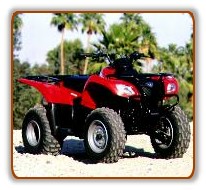 |
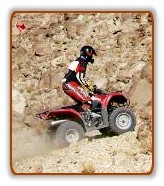 Are you prepared to have fun with a 250-class utility ATV? I didn�t think I was but that changed when Suzuki invited us out to the Ocottillo Wells S.V.R.A. area in California. The 70,000-acre riding area is mostly open flat desert with large mountain ranges popping up in the distance. Spots of interest are the pumpkin patch named for its pumpkin size round rocks and the shell reef sand area with its very “cool” sand hill climbs. The environment is known for its harsh climate, warm dessert temps and stiff windstorms, which is just the kind of stuff we love, pushing the limits of man and machine. The newest is a medium size machine with a combination of sporty features. My biggest, no wait, one of my only complaints is that I was a bit too large for the unit. By this, I mean, while riding aggressively my knees would bang the top of the fuel tank just about where the seat ends. This doesn�t mean I would not purchase one. Large man or not, the thing I have to remember is most consumers would not do the things I do. At six foot-one, two hundred and forty pounds the Ozark had no problem with any situation I put it in. The unit may be a bit small for me but I really felt comfortable on it. Controlling the unit was a breeze; I was able to do anything I wanted and my large body did not hamper my test ride. Suzuki is marketing the Ozark for ages sixteen and up so even an older big fella, like myself, can buy and use the Ozark.
Are you prepared to have fun with a 250-class utility ATV? I didn�t think I was but that changed when Suzuki invited us out to the Ocottillo Wells S.V.R.A. area in California. The 70,000-acre riding area is mostly open flat desert with large mountain ranges popping up in the distance. Spots of interest are the pumpkin patch named for its pumpkin size round rocks and the shell reef sand area with its very “cool” sand hill climbs. The environment is known for its harsh climate, warm dessert temps and stiff windstorms, which is just the kind of stuff we love, pushing the limits of man and machine. The newest is a medium size machine with a combination of sporty features. My biggest, no wait, one of my only complaints is that I was a bit too large for the unit. By this, I mean, while riding aggressively my knees would bang the top of the fuel tank just about where the seat ends. This doesn�t mean I would not purchase one. Large man or not, the thing I have to remember is most consumers would not do the things I do. At six foot-one, two hundred and forty pounds the Ozark had no problem with any situation I put it in. The unit may be a bit small for me but I really felt comfortable on it. Controlling the unit was a breeze; I was able to do anything I wanted and my large body did not hamper my test ride. Suzuki is marketing the Ozark for ages sixteen and up so even an older big fella, like myself, can buy and use the Ozark.
Thinking back to the old Suzuki 250, I remember a slower but very stable ATV. The unit was basic all terrain transportation, not exactly produced with a sporty style in mind. That�s all changed with the introduction of the 2002 Ozark; sporty is its middle name. It has a new styling, great suspension and an engine transmission combination capable of point and shoot fun. The new Ozark is a 4-stroke, single-cylinder, 246cc, air-cooled, SOHC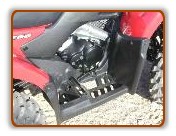
The crankcase/transmission is of a new design, it is known only to the Ozark. Light weight and efficient is how Suzuki put together the Ozark drivetrain, a wet sump lubrication system provides oil to all the necessary parts. Maintenance issues were easy. The air filter was easily accessible; just under the seat; cleaning could be done in just a few easy steps. Changing the oil could have been improved upon though as we like the spin-on oil filter Suzuki uses on most other models. The Ozark is using a cartage type oil filter; this is easy to get at but the spin-on is handy feature. The unit uses a typical layout with the centrifugal clutch on the right side of the crankshaft and the starter, rotor and stator located on the left. The charging system puts out a sufficient 150 watts. The automatic clutch is putting power to 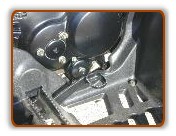
The suspension could turn out to be the most interesting of the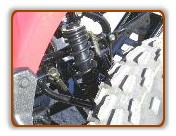
The Ozark comes standard with 6.3inch dual hydraulic front disk brakes; both are operated with a single-piston caliper. In the rear, an adequate sealed cable-operated drum brake does the 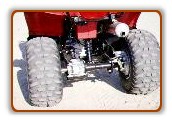
Controls are located in a rider friendly position; steering, braking, and shifting is all positioned in natural form. A rider feels 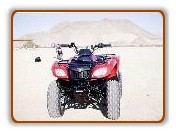
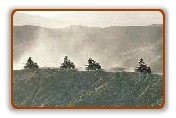
The handling all comes down to the Ozark�s low center of gravity, powerful drivetrain, impressive suspension, ergonomic balance and well designed tire wheel combination (AT22x7-11 front, AT22x10-9 rear). Our test ride in the Ocotillo Wells S.V.R.A. left us with a lot of confidence in the new 250-class 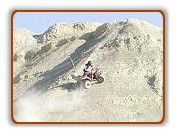
The desert area offers so many ways to test a machine, one
interesting event was when several editors decided to just open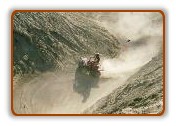
SPECIFICATIONS
MSRP*: ,499
Engine: 246cc, 4-stroke,
single-cylinder,
air-cooled, SOHC,
2-valve, TSCC
Bore & Stroke: 66.0 x 72mm
Compression Ratio: 9.2:1
Fuel System: Mikuni BS29
Lubrication: Wet sump
Ignition: Digital/transistorized
Starter: Electric/recoil
Transmission: 5-speed with
reverse, automatic
clutch, 2WD
Final Drive: Shaft
Overall Length: 1800mm (70.9 in.)
Overall Width: 1045mm (41.9 in.)
Overall Height: 1070mm (42.1 in.)
Ground Clearance: 210mm (8.3 in.)
| Wheelbase: | 1140mm (44.9 in.) |
Dry Weight: 183kg (403 lbs.)
Suspension:
FRONT: Independent, double
A-arm, oil damped,
5.5 inches of travel
REAR: Swingarm-type, oil
damped,
5.5 inches of travel
Brakes:
FRONT: Dual hydraulic discs
REAR: Mechanical Drum
| Tires: | |
| FRONT: | AT 22 x 7-11 |
| REAR: | AT 22 x 10-9 |
Fuel Tank
Capacity: 10.6 liter (2.80 gal.)
| Color: | Green, Red, Yellow |
